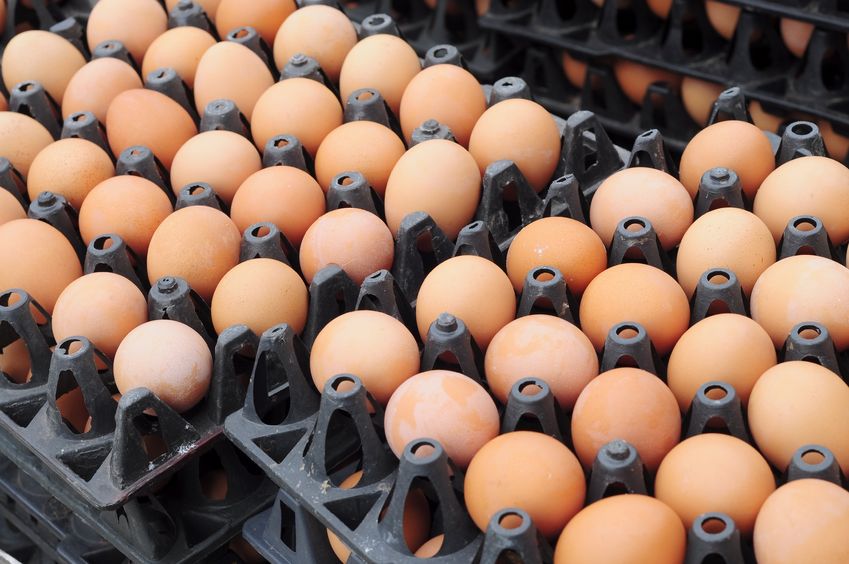
An East Midlands baker was caught using cage eggs in products labelled as using free range eggs, a court was told.
The baker - Sandra Hawkins of Family Bakers, Ratcliffe Gate, Mansfield - was fined £1,240 for failing to label products to protect customers with allergies and other food offences after being fined £162 in February for similar offences.
Hawkins pleaded guilty to seven food safety, hygiene and regulation offences at Mansfield Magistrates Court.
She had previously been fined for not including in her labels correct quantities of ingredients and allergenic substances that may be present in her products.
Nottinghamshire County Council’s Trading Standards officers subsequently carried out a further visit to her premises and found she was still not complying with labelling laws.
The court heard that a further two improvement notices were served on the premises, one of which was not complied with on the next visit.
Other issues were also discovered, including the false egg claim. Products labelled as containing free range eggs did in fact contain a mix of cage and free range eggs.
Councillor John Handley, vice chairman of Nottinghamshire County Council’s Communities and Place Committee, said: “Recent tragic cases have shown the importance of correct labelling on food products as the consequences can be life changing or even fatal for people with allergies.
“Our trading standards officers have made many attempts to help this business comply with labelling legislation, so it’s very disappointing that the owner has failed to address this serious issue for a second time.”
'English eggs labelled Welsh'
Trading standards officers across the country have identified a number of cases involving eggs.
In 2010 Lampeter Eggs was prosecuted by Carmarthenshire Trading Standards for supplying English eggs labelled as Welsh.
An egg marketing inspector discovered that eggs labelled as being from Wales were in fact from two English suppliers. They had been mislabelled to fulfil a contract to supply Welsh eggs.
The company was fined a total of £1,500 for the three offences and ordered to pay a £15 victim surcharge and £1,354 costs.
In another prosecution by Carmarthenshire Trading Standards, a Llanelli woman was fined after she admitted selling cage eggs as free range.
Linda Cavill pleaded guilty at Llanelli Magistrates Court to two offences contrary to the Eggs and Chicks (Wales) Regulations 2009 and to a further offence contrary to Section 15 of the Food Safety Act 1990.
The court was told that Cavill’s company, G&L Cavill and Son, had supplied eggs to a shop in Dryslwyn. A Defra egg inspector called at the shop and tests showed that some eggs packaged as free range were, in fact, cage eggs. The ‘best before’ dates on the eggs were also wrong.
Cavill, of Trimsaran Road, Llanelli, was fined £800 for each of the offences relating to the age of the eggs.
She was fined £2,000 for the Food Safety Act offence, which related to the mis-description of the eggs. She was also ordered to pay full costs of £1,203.48.
'Caged eggs as free range'
In 2013, a court ordered a couple to pay more than £1,700 in fines and costs after being caught selling cage eggs as free range.
The couple, who had been selling the eggs from their home, implying that they were produced by their own hens, had, in fact, bought the eggs from a supplier.
Trading standards officers who launched an investigation into their business found that the eggs were produced in intensive units. The couple pleaded guilty to a series of charges at Bournemouth Magistrates' Court.
The prosecution followed an investigation by officers from Dorset County Council's trading standards service.
The court heard that the accused, Stephen Hobbs, aged 65, and Anne Hobbs, aged 66, both of West Moors Road, Three Legged Cross, Dorset had sold eggs in plain boxes with the producer’s identity markings removed. Hens could be seen roaming freely in their garden.
The implication was that the eggs had been produced by their own flock, said the prosecuting officers.
Best before dates
In 2016 a London egg packer and wholesaler was found guilty of altering ‘best before’ dates in a prosecution initiated by APHA.
A judge at Waltham Forest Magistrates Court heard that the packer - Ziya Gorur – was found to have extended ‘best before’ dates on eggs when APHA inspectors carried out checks on his business.
He had also breached compliance notices, which were issued to him by the APHA inspectors. He was prosecuted under the Eggs and Chicks (England) Regulations 2009.
Gorur pleaded not guilty when he appeared before the district fudge at Waltham Forest Magistrates Court, but was found guilty on a total of four charges after a three and a half hour trial. He was fined £2,000 (£500 per offence) and ordered to pay £500 court costs and a £15 surcharge.
£10m fraud
The most notorious involved Heart of England Eggs near Bromsgrove. Conman Keith Owen was jailed in March 2010 for his part in a £100 million fraud involving the company, in which he sold cage eggs as free range.
Owen dishonestly passed off millions of cage eggs as either free range or organic. He repackaged the eggs and sold them on to unsuspecting suppliers.
The eggs ended up on the shelves of Sainsbury’s and Morrisons, and Owen netted £3 million.
His scam ran from June 2004 to May 2006 before he was caught by Defra inspectors.
The fraud was confirmed when Defra used ultraviolet light to reveal wire imprints on the eggs. The examination was carried out following a tip off from suspicious lorry drivers.
Keith Owen pleaded guilty to three charges of providing false information for accounting purposes when he appeared at Worcester Crown Court. He was sentenced to three years in prison.
The court made a £3 million confiscation order and imposed £250,000 costs. Owen was banned from being a company director for seven years.
